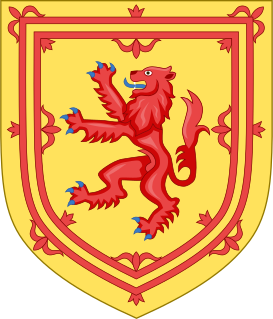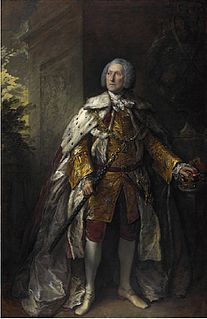Related Research Articles

The House of Lords, formally The Right Honourable the Lords Spiritual and Temporal of the United Kingdom of Great Britain and Northern Ireland in Parliament assembled, also known as the House of Peers, is the upper house of the Parliament of the United Kingdom. Membership is by appointment, heredity or official function. Like the House of Commons, it meets in the Palace of Westminster located in London, England.

The Parliament of the United Kingdom is the supreme legislative body of the United Kingdom, the Crown dependencies and the British overseas territories. It alone possesses legislative supremacy and thereby ultimate power over all other political bodies in the UK and the overseas territories. Parliament is bicameral but has three parts, consisting of the sovereign (Crown-in-Parliament), the House of Lords, and the House of Commons. Both houses of Parliament meet in separate chambers at the Palace of Westminster in the City of Westminster, one of the inner boroughs of the capital city, London.
Presbyterianpolity is a method of church governance typified by the rule of assemblies of presbyters, or elders. Each local church is governed by a body of elected elders usually called the session or consistory, though other terms, such as church board, may apply. Groups of local churches are governed by a higher assembly of elders known as the presbytery or classis; presbyteries can be grouped into a synod, and presbyteries and synods nationwide often join together in a general assembly. Responsibility for conduct of church services is reserved to an ordained minister or pastor known as a teaching elder, or a minister of the word and sacrament.

Royal assent is the method by which a monarch formally approves an act of the legislature, either directly or through an official acting on the monarch's behalf. In some jurisdictions, royal assent is equivalent to promulgation, while in others that is a separate step. Under a modern constitutional monarchy, royal assent is considered little more than a formality. Even in nations such as the United Kingdom, Norway and Liechtenstein which still, in theory, permit their monarch to withhold assent to laws, the monarch almost never does so, except in a dire political emergency or on advice of government. While the power to veto by withholding royal assent was once exercised often by European monarchs, such an occurrence has been very rare since the eighteenth century.

The politics of Scotland operate within the constitution of the United Kingdom, of which Scotland is a home nation. Scotland is a democracy, being represented in both the Scottish Parliament and the Parliament of the United Kingdom since the Scotland Act 1998. Most executive power is exercised by the Scottish Government, led by the First Minister of Scotland, the head of government in a multi-party system. The judiciary of Scotland, dealing with Scots law, is independent of the legislature and the executive. Scots law is primarily determined by the Scottish Parliament. The Scottish Government shares some executive powers with the Government of the United Kingdom's Scotland Office, a British government department led by the Secretary of State for Scotland.
In the United Kingdom, representative peers were those peers elected by the members of the Peerage of Scotland and the Peerage of Ireland to sit in the British House of Lords. Until 1999, all members of the Peerage of England held the right to sit in the House of Lords; they did not elect a limited group of representatives. All peers who were created after 1707 as Peers of Great Britain and after 1801 as Peers of the United Kingdom held the same right to sit in the House of Lords.

The House of Lords Act 1999 is an Act of the Parliament of the United Kingdom that was given Royal Assent on 11 November 1999. The Act reformed the House of Lords, one of the chambers of Parliament. For centuries, the House of Lords had included several hundred members who inherited their seats ; the Act removed such a right. However, as part of a compromise, the Act did permit ninety-two hereditary peers to remain in the House on an interim basis. Another ten were created life peers to enable them to remain in the House.
The British Peerage is governed by a body of law that has developed over several centuries.

General John Campbell, 4th Duke of Argyll KT PC, was a British Army officer and Scottish Whig politician who sat in the House of Commons between 1713 and 1761. From 1729 to 1761 he was known as John Campbell of Mamore.

James Alexander Douglas-Hamilton, Baron Selkirk of Douglas, is a Scottish Conservative politician who served as Member of Parliament for Edinburgh West and then as a Member of the Scottish Parliament (MSP) for the Lothians region. Since 1997 he has been a member of the House of Lords as a life peer.

The moderator of the General Assembly is the chairperson of a General Assembly, the highest court of a Presbyterian or Reformed church. Kirk sessions and presbyteries may also style the chairperson as moderator. The Oxford Dictionary states that a Moderator may be a "Presbyterian minister presiding over an ecclesiastical body".

The General Assembly of the Church of Scotland is the sovereign and highest court of the Church of Scotland, and is thus the Church's governing body. It generally meets each year and is chaired by a Moderator elected at the start of the Assembly.
The Church of Scotland maintains a presbyterian polity and is thus governed by a hierarchy of bodies known as church courts. Each of these courts has a moderator and a clerk.

The first Parliament of the Kingdom of Great Britain was established in 1707 after the merger of the Kingdom of England and the Kingdom of Scotland. It was in fact the 4th and last session of the 2nd Parliament of Queen Anne suitably renamed: no fresh elections were held in England, and the existing members of the House of Commons of England sat as members of the new House of Commons of Great Britain. In Scotland, prior to the union coming into effect, the Scottish Parliament appointed sixteen peers and 45 Members of Parliaments to join their English counterparts at Westminster.

The Lord High Commissioner to the General Assembly of the Church of Scotland is the Scottish Sovereign's personal representative to the General Assembly of the Church of Scotland, reflecting the Church's role as the national church of Scotland and the Sovereign's role as protector and member of that Church.

In the United Kingdom an act of Parliament is primary legislation passed by the Parliament of the United Kingdom.
John Elphinstone, 2nd Lord Balmerino was a Scottish aristocrat, convicted in a celebrated trial of the 1630s which became a crux of the religious issue of the time.

An election for 16 Scottish representative peers took place on 6 October 1959 at the Palace of Holyroodhouse in Edinburgh. It turned out to be the last election for representative peers as in 1963 all holders of titles in the Peerage of Scotland were made eligible to sit in the House of Lords.
A by-election for a Scottish representative peer took place on 1 October 1958 at the Palace of Holyroodhouse in Edinburgh. The election was caused by the death of Archibald Murray, 16th Lord Sinclair. It turned out to be the last by-election for representative peers before all holders of titles in the Peerage of Scotland were made eligible to sit in the House of Lords in 1963.
On 28 August 2019, the Parliament of the United Kingdom was ordered to be prorogued by Queen Elizabeth II upon the advice of the Conservative prime minister, Boris Johnson, advice later ruled to be unlawful. The prorogation, or suspension, of Parliament was to be effective from between 9 and 12 September 2019 and last until the State Opening of Parliament on 14 October 2019; in the event, Parliament was suspended between 10 September and 24 September. Since Parliament was to be prorogued for five weeks and reconvene just 17 days before the United Kingdom's scheduled departure from the European Union on 31 October 2019, the move was seen by many opposition politicians and political commentators as a controversial and unconstitutional attempt by the prime minister to avoid parliamentary scrutiny of the Government's Brexit plans in those final weeks leading up to Brexit. Johnson and his Government defended the prorogation of Parliament as a routine political process that ordinarily follows the selection of a new prime minister and would allow the Government to refocus on a legislative agenda.
References
- "MINUTES OF MEETING held on the 23rd May, 1955, of PEERS OF SCOTLAND for the ELECTION OF THEIR REPRESENTATIVES to sit and vote in the ensuing Parliament of Great Britain and Northern Ireland." House of Lords paper 4 of Session 1955–56, HMSO.
- ↑ Sir James Fergusson, "The Sixteen Peers of Scotland", Oxford University Press, 1960, p. 105-106.
- 1 2 "Scottish Peers Ballot" . The Times. London. 24 May 1955. p. 14.
- ↑ Minutes, HL 4 1955-56, p. 4.